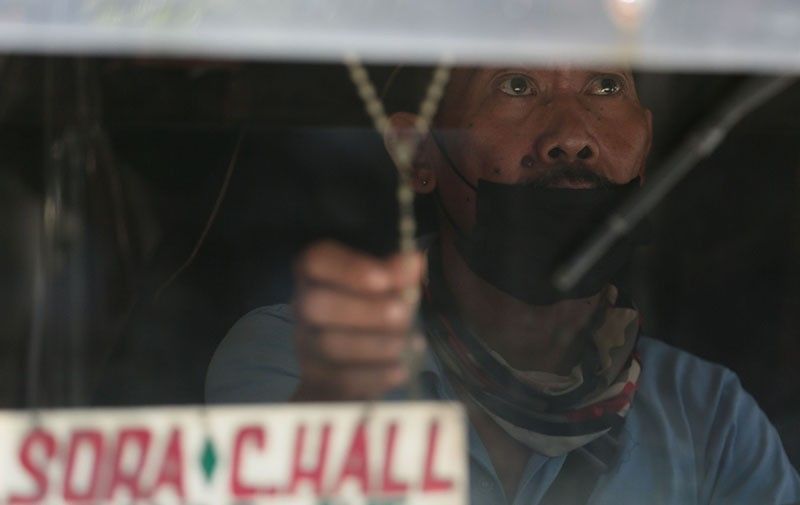Jeepney drivers urge fare hike, fuel subsidy amid oil crisis caused by Russia-Ukraine conflict

MANILA, Philippines — Jeepney drivers and operators Monday urged the national government to expedite the release of fuel subsidies and fare increases to help them withstand the rising costs of diesel fuel brought on by the Russian invasion of Ukraine.
Speaking at the hearing of the House ad-hoc committee on the fuel crisis caused by Russia's invasion of Ukraine, Rep. Edgar Sarmiento (Samar) who chairs the House transportation committee said that the cost of $115.74 per barrel of crude oil as of August 2022 marked the second-highest price since 2008.
Of that amount, the average pump price in the Philippines stands at P67.99, marking the highest so far. The crisis between Russia and Ukraine is seen to threaten the food and oil supply and livelihoods of people in Europe, Africa, and Asia.
Sarmiento added that in the country's road sector, 67.6% — which comprise public utility vehicles such as jeepneys and buses — rely on diesel fuel. From P40.70 in March 6 last year, the average price of diesel products now stands at P58.65 as of Sunday, good for a +44.1% increase.
Pressed for solutions, Land Transportation Franchising and Regulatory Board chair Martin Delgra said that a total of 377,443 beneficiaries are still due to receive funds worth P6,500 per jeepney driver or operator under the Department of Transportation's fuel subsidy.
"The funds were already downloaded sometime in November 2021," he said but admitted that these went to "qualified and legitimate franchise holders" consistent with the TRAIN Law. Jeepney drivers have long said that subsidy funds meant for them more often than not go to operators instead.
"That is actually what is stated in the law... the franchise holder will be the beneficiary," Delgra said. "Because of that law, we have to qualify it in the letter and spirit as it is stated."
Under the government's service contracting program, drivers and operators of public utility vehicles are paid by the government to ply their routes on a per kilometer basis. The program was meant to offset the effects of the capacity restrictions caused by the pandemic. Operators under service contracting are given the fuel subsidy.
Pasang Masda President Obet Martin said that the prevailing fares today were the same ones as those set pre-coronavirus pandemic, which didn't account for the added costs that transport workers had to carry under the pandemic, particularly with the rising price of fuel.
Martin asked the national government to grant public utility vehicles a peso increase in fair to allow them to withstand the effects of the fuel crisis.
Is the LTFRB on board with this? Delgra said that he was "not in the position to make the statement for now."He added, "We will just await the submissions and the discussion for tomorrow."
Where is the fuel subsidy? Undersecretary Roly Toledo of the Department of Budget and Management admitted that the DBM had already received the request for funds from the DOTr but said that "we are still awaiting for the documentary requirements to be sent to us."
"We gave them anytime within the week for this to be submitted," he said.
READ: Service contracting to use 2021 budget with Bayanihan funds expiring — LTFRB
Farmers, fisherfolk were affected too
In a co-signed position paper sent to the ad-hoc committee on the fuel crisis, the Kilusang Magbubukid ng Pilipinas and the Pambansang Lakas ng Kilusang Mamamalakaya ng Pilipinas said that farmers and fisherfolk were also affected as "traders have to transport produce from the farm or storage to the landfills or markets using vehicles that require fuel and oil."
According to KMP data, on one hectare of paddy, approximately 600 liters of fuel can be used by a rotavator and hand tractor per harvest.
"Fuel-efficient irrigation pumps consume 150 liters of fuel per harvest. By calculation, the almost P10 per liter increase in the price of gasoline from January to March 1 added P7,500 per hectare in additional cost per harvest," the paper reads.
"Once the mega big-time oil price hike is imposed, the cost of agricultural crude oil will increase to P10,125 to P11,250."
The two groups also proposed cash aid of P10,000 and production subsidies of P15,000 to the affected sectors and a price ceiling on basic and prime commodities.
They also urged the immediate suspension of excise tax and VAT on petroleum products and fuel subsidy, fuel vouchers to the affected sectors.
- Latest
- Trending

































